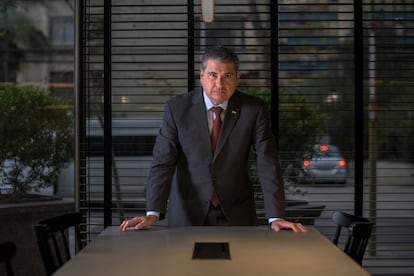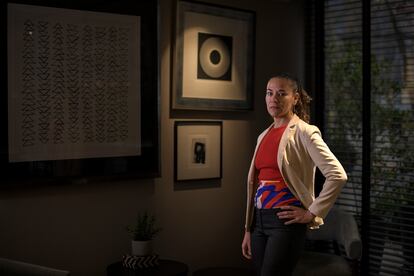Among the hundreds of detractors of the regime of Daniel Ortega and his wife, Rosario Murillo, who have been forced into exile, a group of them landed in Chile this week in the middle of a tour of the south of the region. They have formed a political movement made up of center-left and liberal voices, called Concertación Democrática Nicaragüense-Monteverde (CDN-M), to seek support in Latin America for a civic solution.
In Santiago, Chile, the group says it has held meetings with Foreign Ministry officials, political party leaders, academics and activists to gain support for the 141 political prisoners in Nicaragua.
Eliseo Núñez, a lawyer and executive secretary of the CDN-M, told EL PAÍS that “one of Ortega’s intentions is that, through exhaustion, the international community will reach the point of concluding that there is nothing left to do in Nicaragua. But we believe that there is a civic solution, through international political pressure.”
Núñez is in Chile with two former political prisoners, Juan Sebastián Chamorro – who in 2021 was a presidential candidate in Nicaragua – and feminist activist Tamara Dávila. They recognize the Chilean government as being in solidarity with the exiles, especially for offering residency and nationality to 94 expatriates, including the writers Sergio Ramírez and Gioconda Belli, in February 2023. “We thank them for everything they have done, especially for calling Ortega a dictator because, it may sound trivial, but the fact that a leftist leader, like Boric, calls Ortega a dictator carries a lot of weight, more than it would if someone from the right said it. And calling things by their name speaks volumes about honesty,” says Chamorro.
Boric has repeatedly spoken out against the Nicaraguan regime’s repression, calling Ortega a dictator and urging the international community to condemn the abuses committed in the Central American country. But there is no unanimous position in Latin America regarding the authoritarian drift of Ortega and Murillo.
While some countries such as Chile have taken a frontal stance against the Sandinista leader, he also has the support of nations such as Venezuela and Cuba. Meanwhile, others such as Mexico and Brazil remain neutral. The latter are key – agree Núñez, Chamorro and their partner Tamara Dávila – because they could play a role as mediators in a possible civil solution.
But within this movement they are also concerned about the position of a sector of the left in Chile, such as some Communist Party militants. “Especially the old guard, they have a romantic conception of Ortega. We want them to be better informed about the crimes [del régimen]that they open their eyes and see that this is not an ideological issue, because many of those killed in our country come from Sandinista families. You cannot support or protect a totalitarianism. This contrasts with the position of the president. [Boric]which is more informed,” says Chamorro.

It reinforces, in this regard, that the governments of Boric and Sebastián Piñera (2010-2014, 2018-2022), of the traditional right, especially in their second term, were consistent in their attitude towards the Nicaraguan regime.
Prison or exile
Tamara Dávila, a political and feminist activist who was detained for 20 months at the Directorate of Judicial Assistance, known as El Chipote, in Managua, was banished from her country in 2023, declared stateless and deported to the United States, along with 221 other opponents. “I would have liked to stay in my country, but we were expelled,” she says.
She belonged to the opposition coalition Blue and White National Unity (UNAB), created in 2018 to seek an electoral solution. “We knew that the elections were going to be fraudulent, but we wanted to make this fraud and Ortega’s intention to completely annul the electoral route visible,” she says.

Dávila was arrested in June 2021 and then held in isolation in a cell with a skylight, where she only had contact with her interrogators. Three other women were also deprived of their liberty for political reasons at the time she was imprisoned.
The activist recalls that before being deprived of her freedom, she was persecuted for about ten months by police officers, a practice that she says is common under the Sandinista regime. On the day of her arrest, Dávila was beaten by police, while her then four-year-old daughter witnessed the scene.
Upon her release, almost two years later, she had no other option than to leave the country, without her daughter, with whom she managed to r
eunite a year and eight months after they were separated. In her exile, Dávila has joined the board of directors of the CDN-M under the conviction that all the processes of dialogue for a democratic transition have been crossed by the action of the international community. “So, of course support continues to be essential,” she says.
Subscribe here to the EL PAÍS Chile newsletter and receive all the key information on current events in the country.
#Nicaraguan #exiles #tour #Chile #leftist #leader #Boric #calls #Ortega #dictator #lot #weight